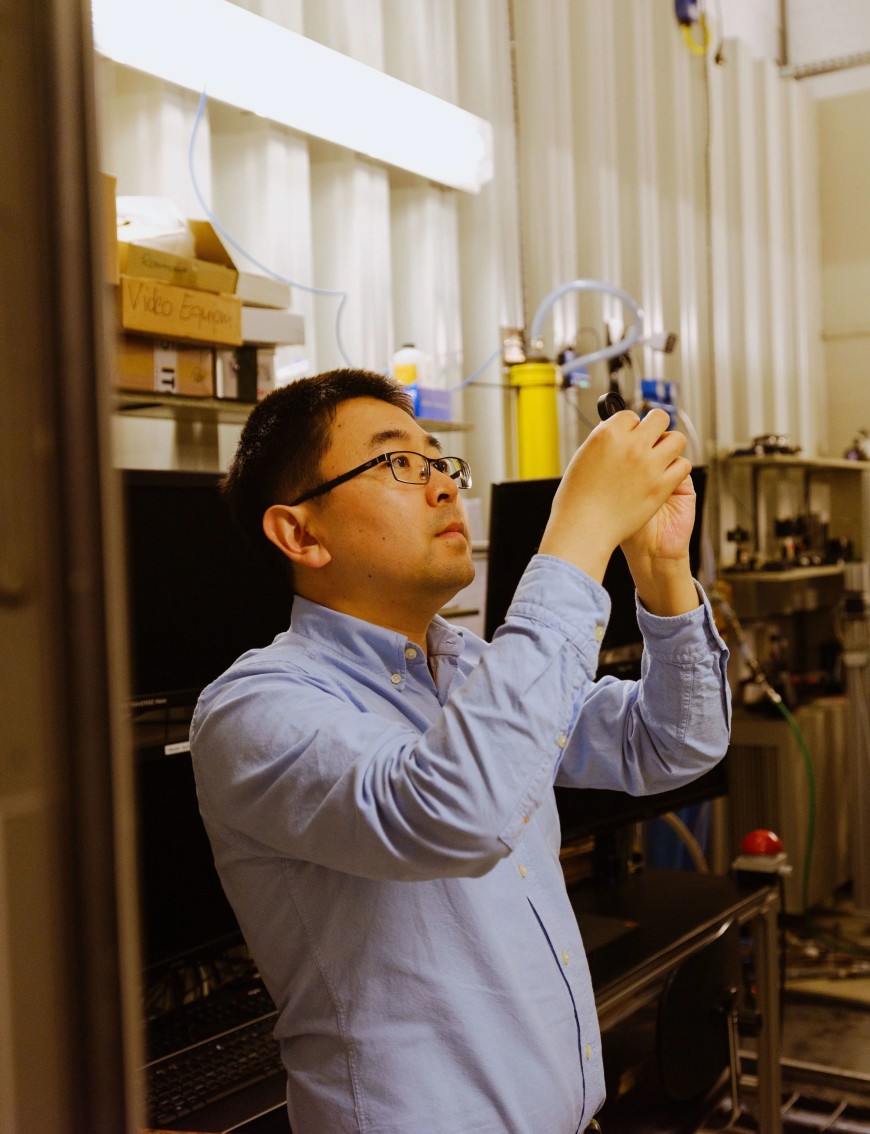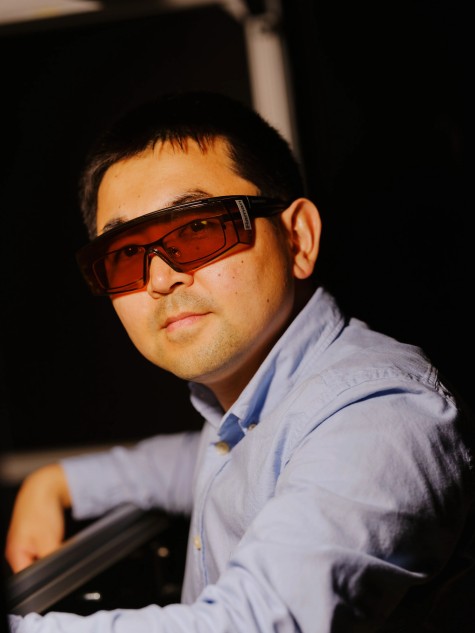New methods for carbon-neutral energy production
Alternative methods for sustainable ammonia production
2025/09/17 by asl/swa
How could carbon-free chemical fuels such as hydrogen, ammonia and metal powder be used as energy sources for a sustainable future? The research of the new Athene Young Investigator Dr Tao Li focuses primarily on the more environmentally friendly, energy-efficient use of ammonia. The mechanical engineer in the Reactive Flows and Measurement Technology department relies on the use of plasma – a still very new method of obtaining ammonia as an alternative fuel.

New approaches in ammonia research
Most people are familiar with this pungent-smelling substance from cleaning products or fertilisers. Human urine can also smell of ammonia. The chemical compound of hydrogen and nitrogen is used in a variety of industrial applications, and its production has traditionally been very energy-intensive. But could its production be made more resource-efficient, and could the gas be used as an alternative fuel of the future? ‘Today, ammonia is mainly produced industrially using the Haber-Bosch process,’ explains Dr Tao Li. In this process, molecular nitrogen from the air is combined with molecular hydrogen in catalysts. ‘However, this requires high temperatures of around 500°C and high pressure of 200 bar,’ says the mechanical engineer. Both require a lot of energy and are expensive. In addition, large plants have to be built.
The Athene Young Investigator, on the other hand, is pursuing a different approach: plasma-driven catalytic synthesis and plasma-assisted ammonia combustion – a relatively new idea that has only been under investigation for around five years. ‘Ammonia produced from green hydrogen offers a carbon-free fuel alternative,’ reports the 37-year-old. The problem is that its low reactivity has so far limited its practical use. Tao Li hopes to use plasma to increase this reactivity. To produce the ammonia, plasma is generated under high voltage. It is intended to serve as a kind of booster to convert hydrogen and nitrogen into ammonia even at room temperature. A similar booster effect occurs during combustion under plasma, which accelerates the oxidation of ammonia. ‘My research investigates non-equilibrium plasmas to improve ammonia synthesis and combustion with minimal energy input. Our group has designed plasma reactors that significantly improve ignition and combustion performance,’ reports the AYI scientist.
Energy-efficient ammonia synthesis
In this way, the alternative fuel could also be produced with just a few devices and at a significantly lower cost and in a more environmentally friendly manner. Ammonia is easy to liquefy and easier to transport than hydrogen, and does not pose the same explosion hazard, according to Tao Li. He is convinced that it could be used as an alternative fuel in industry, for aircraft engines or in households. “Fuels such as ammonia can store intermittent renewable energies such as solar and wind energy over long periods of time and can be transported worldwide, solving the main challenges of renewable energies – fluctuations and geographical limitations. By replacing fossil fuels in power generation, transportation and industrial heating, these green chemicals are critical to sustainable and affordable decarbonisation,” he emphasises.
Tao Li is particularly interested in researching the fundamental energy conversion mechanisms of these fuels in thermochemical processes. Unlike fossil fuels, green alternatives have radically different combustion properties – such as the aforementioned explosiveness of hydrogen, low reactivity of ammonia, or the particulate emissions of metal fuels. ‘Adapting the existing infrastructure requires a thorough understanding of its complex, multiphase reaction dynamics, involving chemical kinetics, fluid mechanics, and heat and mass transfer.’ To decipher these physical relationships, he is developing an advanced multiphysics laser diagnostic that enables direct measurement of critical parameters such as temperature, species concentrations and particle dynamics. ‘This data not only provides insight into the underlying science, but also feeds directly into the design of next-generation reactors and the optimisation of industrial processes,’ he explains, confident that his work, by linking basic research and technical applications, could accelerate the practical introduction of carbon-neutral energy solutions.
Privilege to do research at TU Darmstadt
The Technical University of Darmstadt offers the scientist, who was born near Beijing, ‘an ideal environment for cutting-edge research’. Tao Li completed his bachelor's degree in mechanical engineering at Tongji University in Shanghai, a partner university of the Technical University. The scientist decided to move to Germany and Darmstadt to pursue his master's degree and later his doctorate. He says it is a privilege ‘to conduct research in one of the world's leading laboratories for advanced laser diagnostics and combustion and to collaborate with outstanding researchers on topics of great economic and social relevance’. For the family man, the AYI award is ‘a great honour and also a significant confirmation of the potential of my research to drive sustainable energy innovations.’
The funding recognises the highly interdisciplinary nature of his research, which combines experimental and numerical approaches from the fields of combustion science, chemistry and materials science. The AYI will help him to establish his own research group, supervise doctoral students and pursue independent research directions with greater freedom. Tao Li is convinced that the prestige of the award will certainly play an important role in the search for new collaborations with other institutions and industry partners. At the same time, he hopes that the award will accelerate his career: the young researcher would like to become a professor.
Athene Young Investigator Programme
The Technical University of Darmstadt has established the Athene Young Investigator (AYI) programme to promote the early scientific independence of particularly qualified scientists in the early stages of their careers and to give them the opportunity to qualify for appointment as professors by independently leading a junior research group.
The programme was designed as a five-year, quality-assured programme in which junior research group leaders are granted certain professorial rights and their own budget.
Since the programme was launched in 2017, 40 early career researchers at TU Darmstadt have been funded as Athene Young Investigators. Many of them now work as professors at universities.





